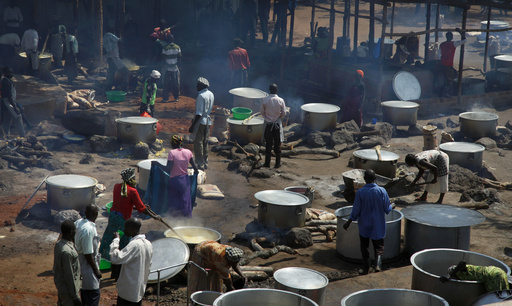WASHINGTON — In recent weeks, the Trump administration has initiated significant changes to the U.S. Agency for International Development (USAID), resulting in a wave of upheaval within the organization. This has led to the temporary suspension of various humanitarian programs, impacting vital assistance such as nutritional support for vulnerable infants and children.
Established during John F. Kennedy’s presidency amidst the Cold War, USAID was created to streamline the U.S. response to foreign aid needs in a more efficient manner than the State Department could provide. Through the Foreign Assistance Act, USAID was formed as an independent agency in 1961, intending to counter Soviet influence through targeted assistance initiatives. Over the years, USAID has remained a focal point in bipartisan battles regarding its funding and operations, with supporters citing its role in curbing the influence of adversarial nations like Russia and China today.
Since the inauguration of Trump, the approach towards USAID has shifted dramatically. Shortly after taking office, Trump enacted a 90-day freeze on foreign assistance, which was further tightened by political appointee Peter Marocco, leading to the shutdown of thousands of aid programs. While Secretary of State Marco Rubio has made efforts to sustain critical emergency measures during this freeze, the lack of clarity concerning which programs are protected has left many organizations uncertain about their futures in providing essential aid.
The repercussions of this administrative freeze have been severe. Dozens of top officials have been placed on leave, and thousands of contractors have lost their jobs as the agency has drastically reduced its operations. With the headquarters in Washington becoming inaccessible to employees and the agency’s online presence effectively silenced, the impact has resonated throughout the humanitarian community.
Rubio described the administration’s objective as a careful reassessment of aid programs to ensure they align with enhancing America’s security and prosperity, claiming this would encourage reciprocal cooperation from aid recipients. However, critics voice concerns that the ongoing freeze could hinder important humanitarian aid, especially as sectors traditionally funded by the U.S. grapple with halted operations.
The fate of funding for United Nations agencies, renowned for their roles in peacekeeping, human rights, and refugee support, remains uncertain as historical patterns suggest Republican administrations have often sought cuts in these areas. Efforts have already unfolded during Trump’s previous term, including a withdrawal from the U.N. Human Rights Council and halting assistance to the Palestinian Authority, actions that align with a broader agenda of reducing U.S. financial commitments internationally.
In a notable development, Tesla CEO Elon Musk has been vocal in pursuing reforms under his initiative, dubbed the Department of Government Efficiency (DOGE), targeting USAID for alleged mismanagement of funds and initiating a push for deeper cuts across government spending.
The ramifications of the current USAID freeze may be most severely felt in Sub-Saharan Africa, where last year the U.S. contributed over $6.5 billion in humanitarian support. Reports indicate that critical health clinics, including those for HIV patients, face closures, while various support programs for displaced individuals and marginalized communities across Latin America, such as those aiding migrants in Mexico, have been dismantled.
Domestically, a recent survey indicated a majority of Americans believe the government allocates excessive resources to foreign aid, with many feeling more funds should be directed towards pressing domestic needs. This mixed sentiment towards foreign assistance indicates a growing disconnect between governmental priorities and public perception regarding budget allocations.
As for the future of USAID, it is unclear whether Trump has the authority to dissolve the agency unilaterally. Past attempts to slash foreign aid budgets have met with resistance from Congress, which prevented significant changes. Any move to eliminate USAID or embolden austerity measures could reignite similar legal challenges, drawing attention to rules such as the Impoundment Control Act that govern the appropriation of funds.
In light of current developments, the conversations surrounding USAID’s role, funding, and operational effectiveness will continue to evolve against a backdrop of fluctuating domestic and international priorities.



